Best Credit Cards for Fair Credit in Canada July 2024
Fact Checked: Scott Birke
Updated: July 17, 2024
Having a fair credit score (ranging from 600 to 650) might give you the impression that rewards credit cards are out of reach.
However, there are many credit cards designed for those with fair credit, no need to compromise on a subpar card.
We’ve rounded up a list of the best cards for those with lower credit score requirements than other cards and better benefits.
Here are the best Canadian credit cards for fair credit including some that offer cash back, some that offer travel rewards, some with no annual fee and more.
The top Canadian credit cards for fair credit scores of 650 or less
| Best credit card for fair credit | Best for | How to Sign-Up |
|---|---|---|
-1715961837.png)
|
Best overall credit card for fair credit: BMO CashBack® Mastercard® | Apply now |
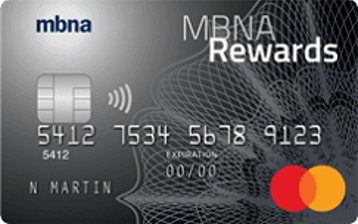
|
Best fair credit credit card for cash back: MBNA Rewards Platinum Plus® Mastercard® | Apply now |
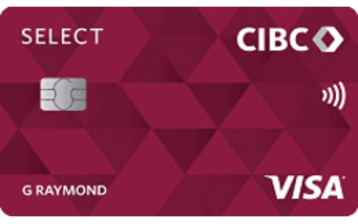
|
Best balance transfer credit card for fair credit: CIBC Select Visa* Card | Learn More |
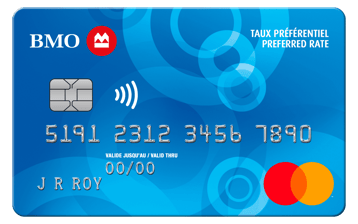
|
Best low interest credit card for fair credit: BMO Preferred Rate Mastercard®* | Apply now |
Best overall fair credit credit card
BMO CashBack® MasterCard®
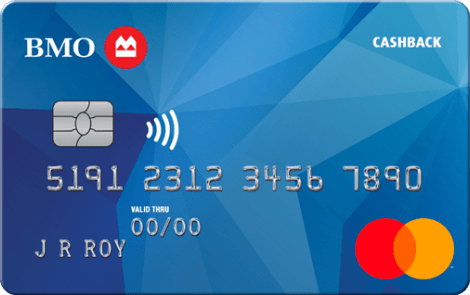
4.0
5% cash back
Welcome offerGood
Suggested credit scoreGet 5% cash back in your first 3 months*
Expires
Nov 30, 2024
Pros
-
No Annual Fee: A rare find in Canada for a cash back card
-
A generous 3% cash back on groceries (up to $500 monthly)
-
Easily redeem from $1, set up automatic redemptions, or use as a statement credit
-
Additional perks include discounts on rentals, free supplementary cards and show discounts
Cons
-
Outside of groceries and recurring payments, the standard earn rate drops to 0.5%
-
Monthly caps on top earn rates for groceries and recurring payments
-
A 2% balance transfer fee applies
-
The interest rate on the remaining balance transfer amount increases after the introductory period
Eligibility
Good
Recommended Credit Score
$15,000
Required Annual Personal Income
Recommended Credit Score
Good
Required Annual Personal Income
$15,000
3%
Cardholders earn 3% (up to a monthly max of $500) cash back on groceries
1%
Cardholders can earn 1% (up to $500 per month) on any recurring bill payments*
0.5%
Cardholders can earn 0.5% (no monthly max) on all other eligible purchases*
Cardholders earn 3% (up to a monthly max of $500) cash back on groceries
3%
Cardholders can earn 1% (up to $500 per month) on any recurring bill payments*
1%
Cardholders can earn 0.5% (no monthly max) on all other eligible purchases*
0.5%
20.99%
Purchase APR
22.99%
Cash Advance APR 21.99% for Quebec residents
$0
Annual Fee
Purchase APR
20.99%
Cash Advance APR
22.99%
Annual Fee
$0
Pros
-
No Annual Fee: A rare find in Canada for a cash back card
-
A generous 3% cash back on groceries (up to $500 monthly)
-
Easily redeem from $1, set up automatic redemptions, or use as a statement credit
-
Additional perks include discounts on rentals, free supplementary cards and show discounts
Cons
-
Outside of groceries and recurring payments, the standard earn rate drops to 0.5%
-
Monthly caps on top earn rates for groceries and recurring payments
-
A 2% balance transfer fee applies
-
The interest rate on the remaining balance transfer amount increases after the introductory period
Eligibility
Good
Recommended Credit Score
$15,000
Required Annual Personal Income
Recommended Credit Score
Good
Required Annual Personal Income
$15,000
3%
Cardholders earn 3% (up to a monthly max of $500) cash back on groceries
1%
Cardholders can earn 1% (up to $500 per month) on any recurring bill payments*
0.5%
Cardholders can earn 0.5% (no monthly max) on all other eligible purchases*
Cardholders earn 3% (up to a monthly max of $500) cash back on groceries
3%
Cardholders can earn 1% (up to $500 per month) on any recurring bill payments*
1%
Cardholders can earn 0.5% (no monthly max) on all other eligible purchases*
0.5%
20.99%
Purchase APR
22.99%
Cash Advance APR 21.99% for Quebec residents
$0
Annual Fee
Purchase APR
20.99%
Cash Advance APR
22.99%
Annual Fee
$0
Best credit card for fair credit score with cash back
MBNA Rewards Platinum Plus Mastercard
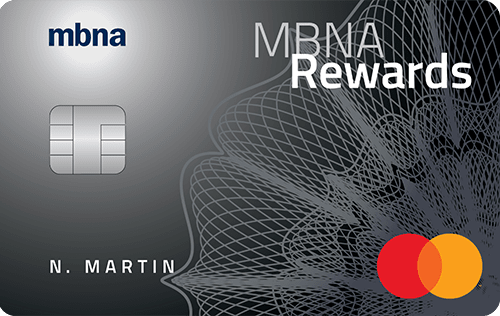
4.0
up to 10K pts
Welcome offerGood
Suggested credit scoreEarn 4 points per $1 spent on eligible restaurant, grocery, digital media, membership, and household utility purchases until $10,000 is spent annually. You could also receive up to 10,000 bonus points.
Pros
-
No annual fee
-
Accelerated rewards on groceries, restaurants, and more
-
Simple point structure with flexible redemption options
-
Generous introductory bonus of up to 10,000 points
-
No cap on total points earned
Cons
-
Lower cash back redemption rate compared to designated cash back cards
-
Limited benefits beyond rewards
-
Points system may not appeal to cash back enthusiasts
-
Higher earning categories have a spending cap of $10,000 annually
-
Better suited for travel rewards than cash back
Eligibility
Good
Recommended Credit Score
Recommended Credit Score
Good
10,000
Get up to 10,000 MBNA Rewards points†† as an introductory bonus (see details below)
Get up to 10,000 MBNA Rewards points†† as an introductory bonus (see details below)
10,000
19.99%
Purchase APR
22.99%
Balance Transfer Rate
24.99%
Cash Advance APR
$0
Annual Fee
Purchase APR
19.99%
Balance Transfer Rate
22.99%
Cash Advance APR
24.99%
Annual Fee
$0
Pros
-
No annual fee
-
Accelerated rewards on groceries, restaurants, and more
-
Simple point structure with flexible redemption options
-
Generous introductory bonus of up to 10,000 points
-
No cap on total points earned
Cons
-
Lower cash back redemption rate compared to designated cash back cards
-
Limited benefits beyond rewards
-
Points system may not appeal to cash back enthusiasts
-
Higher earning categories have a spending cap of $10,000 annually
-
Better suited for travel rewards than cash back
Eligibility
Good
Recommended Credit Score
Recommended Credit Score
Good
10,000
Get up to 10,000 MBNA Rewards points†† as an introductory bonus (see details below)
Get up to 10,000 MBNA Rewards points†† as an introductory bonus (see details below)
10,000
19.99%
Purchase APR
22.99%
Balance Transfer Rate
24.99%
Cash Advance APR
$0
Annual Fee
Purchase APR
19.99%
Balance Transfer Rate
22.99%
Cash Advance APR
24.99%
Annual Fee
$0
Best credit card for fair credit with balance transfers
CIBC Select Visa* Card
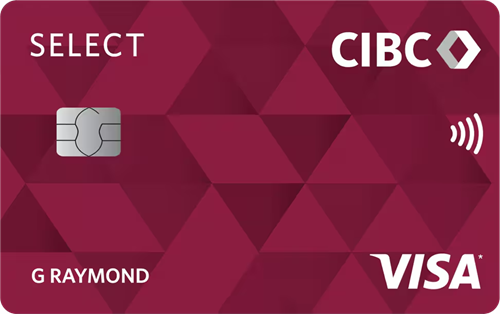
5.0
Good
Suggested credit scoreTransfer your credit card balance - Get 0% interest for up to 10 months with a 1% transfer fee† and a two year annual fee rebate†
Pros
-
0% Balance Transfer rate for a generous 10 months with a low (1%) Balance Transfer fee†
-
13.99%† Purchase Annual Interest Rate
-
A two year annual fee rebate†
-
No annual fee for additional cards (up to 3)
Cons
-
There are other low interest cards available with no annual fee whatsoever
-
Few distinguishing benefits beyond its interest rates
Eligibility
Good
Recommended Credit Score
$15,000†
Required Annual Household Income
Recommended Credit Score
Good
Required Annual Household Income
$15,000†
0%
Pay 0% interest for up to 10 months with a 1% transfer fee.†
Pay 0% interest for up to 10 months with a 1% transfer fee.†
0%
13.99%†
Purchase APR
13.99%†
Balance Transfer Rate
13.99%†
Cash Advance APR
$29
Annual Fee Two year annual fee rebate† $0 for up to 3 additional cards.†.
Purchase APR
13.99%†
Balance Transfer Rate
13.99%†
Cash Advance APR
13.99%†
Annual Fee
$29
Pros
-
0% Balance Transfer rate for a generous 10 months with a low (1%) Balance Transfer fee†
-
13.99%† Purchase Annual Interest Rate
-
A two year annual fee rebate†
-
No annual fee for additional cards (up to 3)
Cons
-
There are other low interest cards available with no annual fee whatsoever
-
Few distinguishing benefits beyond its interest rates
Eligibility
Good
Recommended Credit Score
$15,000†
Required Annual Household Income
Recommended Credit Score
Good
Required Annual Household Income
$15,000†
0%
Pay 0% interest for up to 10 months with a 1% transfer fee.†
Pay 0% interest for up to 10 months with a 1% transfer fee.†
0%
13.99%†
Purchase APR
13.99%†
Balance Transfer Rate
13.99%†
Cash Advance APR
$29
Annual Fee Two year annual fee rebate† $0 for up to 3 additional cards.†.
Purchase APR
13.99%†
Balance Transfer Rate
13.99%†
Cash Advance APR
13.99%†
Annual Fee
$29
Best low interest credit card for bad credit:
BMO Preferred Rate Mastercard®*
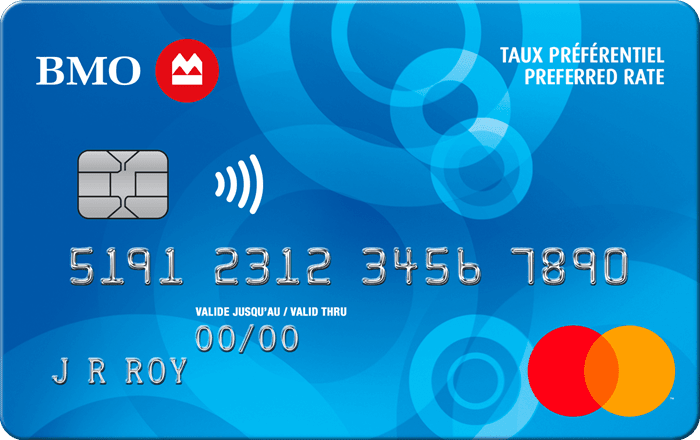
3.6
0.99% rate
Welcome offerGood
Suggested credit scoreGet a 0.99% introductory interest rate on Balance Transfers for 9 months with a 2% transfer fee and BMO will waive the $29 annual fee in your first anniversary*.
Expires
Nov 30, 2024
Pros
-
Low-interest rate: Offers a competitive purchase interest rate
-
Introductory balance transfer offer for the first nine months
-
First-year annual fee waiver
-
BMO PaySmart™ Installment plans: Turn new credit card purchases into small, interest-free monthly payments with a small fee.
-
Additional cardholder: You can add an additional cardholder for free
-
Free extended warranty and purchase protection*
-
Zero Dollar Liability: protects you from unauthorized use of your credit card*
Cons
-
No rewards: Your focus is paying down debt, not collecting miles.
-
Foreign transaction fee: Charges a 2.5% fee on foreign transactions.
-
Balance transfer fee: While normal, it’s a bit painful to have to fork over a 2% fee on balance transfers.
Eligibility
Good
Recommended Credit Score
$0
Required Annual Personal Income
$0
Required Annual Household Income
Recommended Credit Score
Good
Required Annual Personal Income
$0
Required Annual Household Income
$0
0.99%
0.99% introductory interest rate on balance transfers for 9 months with a 2% transfer fee and BMO will waive the annual fee on your first anniversary.*
0.99% introductory interest rate on balance transfers for 9 months with a 2% transfer fee and BMO will waive the annual fee on your first anniversary.*
0.99%
13.99%
Purchase APR
15.99%
Balance Transfer Rate
15.99%
Cash Advance APR
$29
Annual Fee
Purchase APR
13.99%
Balance Transfer Rate
15.99%
Cash Advance APR
15.99%
Annual Fee
$29
Pros
-
Low-interest rate: Offers a competitive purchase interest rate
-
Introductory balance transfer offer for the first nine months
-
First-year annual fee waiver
-
BMO PaySmart™ Installment plans: Turn new credit card purchases into small, interest-free monthly payments with a small fee.
-
Additional cardholder: You can add an additional cardholder for free
-
Free extended warranty and purchase protection*
-
Zero Dollar Liability: protects you from unauthorized use of your credit card*
Cons
-
No rewards: Your focus is paying down debt, not collecting miles.
-
Foreign transaction fee: Charges a 2.5% fee on foreign transactions.
-
Balance transfer fee: While normal, it’s a bit painful to have to fork over a 2% fee on balance transfers.
Eligibility
Good
Recommended Credit Score
$0
Required Annual Personal Income
$0
Required Annual Household Income
Recommended Credit Score
Good
Required Annual Personal Income
$0
Required Annual Household Income
$0
0.99%
0.99% introductory interest rate on balance transfers for 9 months with a 2% transfer fee and BMO will waive the annual fee on your first anniversary.*
0.99% introductory interest rate on balance transfers for 9 months with a 2% transfer fee and BMO will waive the annual fee on your first anniversary.*
0.99%
13.99%
Purchase APR
15.99%
Balance Transfer Rate
15.99%
Cash Advance APR
$29
Annual Fee
Purchase APR
13.99%
Balance Transfer Rate
15.99%
Cash Advance APR
15.99%
Annual Fee
$29
Expert tip: Using easy to get credit cards to boost your credit score
High-end credit cards with all the bells and whistles of top-tier perks and benefits will require a good credit score. But that doesn’t mean that Canadians with fair credit scores need to settle for a credit card with no perks. While the benefits of these best credit cards for fair credit may not be at the same level as some of the high-end premium cards, you can still earn rewards or cash back and find no annual-fee cards, even if you have a lower credit score. Remember, paying off your credit card in full and on time is also a great way to boost your credit score so that, in the future, you can apply and qualify for a more lucrative credit card.
—Hannah Logan, Money.ca credit card, saving and travel expert
BMO Preferred Rate Mastercard®* vs. CIBC Select Visa* Card
You might be wondering what sets the BMO Preferred Rate Mastercard®* apart from the CIBC Select Visa* Card. They seem pretty similar, right?
The fact of the matter is, these cards are similar, even right down to their annual fees and Purchase Interest Rate. But the CIBC Select Visa* Card is slightly better for balance transfers because it charges 0% interest for 10 months and has only a 1% fee† (rather than 9 monthswith a 2% fee*).
*Terms and conditions apply.
What is a fair credit score?
Canadian credit scores range from 300 to 900. Although it’s difficult to accurately determine where exactly the average Canadian falls, 650 is generally considered to be fair credit, and somewhere around the middle for those with credit.
With a credit score at or slightly above/below the average, you may often find yourself right on the line of eligibility requirements. Some credit card issuers will consider your application after seeing your score and others will not. It depends on what kind of product you’re applying for and what the rest of your file looks like, from your income to your borrowing habits.
There are a lot of different events that can lead to a fair credit score. If you don’t have any credit yet because you haven’t borrowed money, you won’t have a credit score yet. This is also true of those new to Canada. In these cases, you will build credit slowly as you pay your bills, take out loans, and otherwise use credit and may soon find yourself in low-fair to fair territory.
But there are also factors that can contribute to your credit score falling from good to average or fair. For example, enough missed payments on your report or applying for new credit too frequently can decrease your score. It’s also possible to dip in and out between fair and good credit depending on your borrowing and bill payment history.
Then there are ways you can fall more substantially. Individuals with bankruptcies, for example, will need to work hard to build their credit back. Likely, they will restart at 300 and pass through fair to get to good.
With the wide range of factors affecting credit scores, keeping yours in great shape is challenging but important. You can check your credit score at any time through TransUnion and Equifax without affecting your credit.
Read more: The ultimate guide to credit scores in Canada
How to choose a credit card card for fair credit in Canada
Choosing a credit card when you have fair or average credit is about knowing what options you have and what options you don’t have because you don’t have the ideal credit score. Let’s start with how you should be thinking about interest rates.
Interest
If you have average or fair credit, you’ll mostly get stuck with rates somewhere in the mid- to high-range for any credit card and may be limited to only cards with higher ranges.
So when you see an interest rate range, assume that you’ll land somewhere in the top 50% of those rates. On loans, credit cards, and other lines of credit, the best or lowest APYs are typically offered to the applicants with the highest credit scores, highest incomes, and cleanest credit histories (i.e. no delinquencies, missed payments, bankruptcies, etc.).
But that’s not to say that you can’t comparison shop to find the best rates you’re likely to qualify for. There can be significant differences in interest rates from one card to the next, and if you see yourself carrying a balance, it’s worth shopping around. For example, the BMO Preferred Rate Mastercard®* and CIBC Select Visa* Card have the lowest rates from our picks.
Fees
Annual fees are the biggest expense to consider when browsing credit cards, but there are a lot of smaller fees to think about too. Balance transfer fees, cash advance fees, foreign currency conversion or foreign transaction fees, and late fees are a few more expenses charged by all cards, not just credit cards for fair credit. Some of these can be avoided with responsible use while others can’t.
Even if you don’t choose a credit card based solely on fees, you should know what you’re getting yourself into before signing up.
Annual fees
You may decide to rule credit cards out based on annual fees alone if that’s not an expense you have room in your budget for right now.
Unfortunately, credit cards for fair credit are more likely to charge annual fees because this is a way for credit card issuers to protect themselves, but there are still enough no-annual-fee credit cards out there – including the BMO CashBack® Mastercard®*, MBNA Rewards Platinum Plus® Mastercard®, and the Home Trust Preferred Visa – that you can choose from if you’re taking a hard stance on annual fees. Which is totally your prerogative.
Read more: Why pay for a credit card with an annual fee?
Rewards
Not every credit card is going to come with a rewards program. And sometimes, you may have to choose between rewards and other benefits such as lower interest rates.
But if you are interested in rewards, cash back is one of the best options as it tends to be the most flexible to redeem. For example, maybe one day you feel like using your cash back for a statement credit and another day you feel like taking yourself shopping (online). When you just earn cash, you can have this option. Points and miles/travel rewards are great too, but they can be a bit more difficult to apply and use for all they’re worth.
Income requirements
Many Canadian credit cards are fairly transparent about what your income needs to be in order to qualify when applying. They will tell you the absolute minimum annual income they’ll accept and aren’t likely to budge. Very often, this is around $15,000 for your household.
You’ll need to state your income on almost any credit card application. But while most cards won’t require you to submit proof of income documents such as tax returns or earnings statements, credit cards for fair credit might. Be prepared for this when applying, especially if your credit history contains some red flags.
When considering credit cards you can qualify for with your income, you also want to think about which credit card benefits are going to be most appropriate for your money and lifestyle. For example, if a card has a low cap on rewards spending, would this affect you? And if the card has a high annual fee, is it worth the savings you could potentially get?
Read more: What credit card should you have at your income level?
Welcome offers for fair credit credit cards
Bonuses are great. Free money is great. But try not to get so caught up in enticing welcome offers and promotions that you forget the most important features you’re looking for in a credit card. If a credit card is a good fit and happens to offer a bonus for new applicants, fantastic. We’re happy for you if it works out!
But if a credit card doesn’t feel like a good fit because it doesn’t have the benefits you’re looking for or you don’t think you can qualify for it with your credit score, history, and/or income, don’t waste your time applying. It’s not meant to be.
Unsecured vs. secured credit cards: Which is best for fair credit?
For fair credit borrowers, both unsecured cards and secured credit cards are on the table, and they each offer distinct advantages and disadvantages. So what kind of credit card should you choose?
To start, let’s talk about some of the main differences between unsecured and secured credit cards. These are:
- Secured credit cards require security deposits as collateral while unsecured cards do not (this mitigates risk for lenders and makes it more difficult for you to go into debt)
- Credit limits are typically lower for secured cards and are usually determined by the amount you deposit
- Secured cards may have higher interest rates
- You can qualify for select secured and unsecured cards with little credit and poor scores but will have an easier time qualifying for a secured card
The most important similarity between these two types of cards is that both affect your credit. For either kind, you’re responsible for paying off your bill each month and your payment activity may be reported to the two main credit bureaus in Canada, Equifax and TransUnion.
For better or worse, your payment activity will show up in your credit history no matter what kind of card you choose. So late or missed payments will hurt while on-time payments will help.
Secured cards tend to be better for newer borrowers and those with worse scores. There are downsides like fees and lower credit limits, but they are often the smartest option for many people including those struggling with debt and those with low or no steady income. They may also be the only realistic choice if your credit is on the low end of fair or bordering on poor.
And remember, you can always get an unsecured credit card in the future if you want to.
Read more: What’s the difference between a secured and an unsecured credit card?
How to qualify for credit cards with fair credit in Canada
Having fair credit will, unfortunately, put some financial products out of reach for you, and that includes a lot of the best credit cards. But you will still be able to qualify for a number of different secured and unsecured credit cards.
If you need to apply for a credit card right now, always check to see if you’re preapproved for a card you’re interested in before you submit any formal applications. This will help you avoid adding hard inquiries or hard checks to your report, which can damage your credit.
If you can hold off on applying for a new credit card until you’ve had a chance to improve your score, try to wait until your credit is on the high end of average or better. In general, the credit cards with the most benefits and best terms want applicants with scores of at least 700 or 750.
But it also depends on why your credit is fair. If it’s lower because you’re still new to credit and building your credit history up for the first time, you could have an easier time getting approved for new credit than someone with missed payments and bankruptcies in their credit report.
Whether you’re applying for a card now or not, keep working on your credit! You won’t change your credit score overnight and it could take several months before you see a real difference. But any progress you can make to prove that you’re a responsible borrower can help your chances of getting the credit cards you really want down the road.
How to bump your credit score from fair to good
If you’re in the fair credit range right now, chances are you don’t want to stay there forever. But fortunately, there are a number of different things you can tackle to bump your credit score into the next bracket and improve your chances of borrowing in the future.
Achieving a good credit score is about consistency. There are no guaranteed shortcuts for bringing your score up quickly, but there are several steps you can take now.
Avoid applying for new credit – Do your best to use the credit you have before applying for more. Applying for new credit such as loans and credit cards is not a good idea if your credit isn’t in a good place because it can indicate to lenders that you’re short on cash (which might be true, but having this reflected in your credit file will only make matters worse) and potentially living above your means.
Use the credit you have – Especially if your credit history is thin or limited, you want to do your best to use the lines of credit you already have open. This can show that you’re able to manage your debt and could be ready for more. Using some credit and then paying it back right away is better evidence of responsibility than using no credit at all.
Just be mindful of your credit utilization ratio, or the total amount of credit you’re using over your combined credit limit across all your cards and accounts. If your credit utilization is high, lenders may worry about your ability to continue paying off your debt. In these cases, they’d want to see you pumping the brakes rather than applying to borrow more.
Keep your debt-to-income ratio low – Use the credit cards you have, if you have any, for everyday purchases and spending, but avoid carrying balances. Keeping your cards paid off will lower your overall debt-to-income ratio or the total percentage of your income that goes toward debt repayment. Maxing out your overall credit limit every month can reflect poorly on your money management skills and raise concerns about your cash flow.
If you have a lot of credit card debt, consider a balance transfer credit card.
Make your payments on time – One of the best things you can do for your long-term credit health is to get into the habit of paying all your bills on time, not just your credit card bills. Take advantage of the ability to make automatic payments whenever you can so late payments don’t end up on your report and bring your score down.
Credit cards for fair credit FAQs
Summary: Best fair credit credit cards
Fair credit shouldn’t prevent you from getting a credit card in Canada. Credit cards are for everybody, and there are so many with more lenient credit score requirements that you can qualify for at this stage of your credit journey rather than having to wait until the next one, whatever that looks like for you. Many even earn cash back and other rewards, like several on our list.
The point is, you have options. Take advantage of them!
Read more:
BMO is not responsible for maintaining the content on this site. Please click on the Apply now link for the most up to date information.

Lauren Graves is a writer and editor specializing in finance writing and education.
Best credit card guides
Disclaimer
The content provided on Money.ca is information to help users become financially literate. It is neither tax nor legal advice, is not intended to be relied upon as a forecast, research or investment advice, and is not a recommendation, offer or solicitation to buy or sell any securities or to adopt any investment strategy. Tax, investment and all other decisions should be made, as appropriate, only with guidance from a qualified professional. We make no representation or warranty of any kind, either express or implied, with respect to the data provided, the timeliness thereof, the results to be obtained by the use thereof or any other matter. Advertisers are not responsible for the content of this site, including any editorials or reviews that may appear on this site. For complete and current information on any advertiser product, please visit their website.





